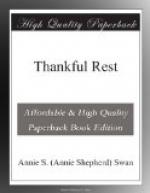Just as the old eight-day clock in the lobby solemnly struck four, there was a loud knock at the back door, and the post-messenger from Pendlepoint strode into the kitchen, holding in his hand a black-edged letter.
“Bad news for ye, Miss Hepsy, I doubt,” he said. “It’ll be from your sister in Newhaven, I reckon.”
Miss Hepzibah took the black-edged letter coolly in her hand, eyed it stolidly for a second, and then laid it on the table. “Sit down a minute, Ebenezer, an’ I’ll bring ye a glass of cider,” she said.
And Ebenezer saw her depart to the larder nothing loath. But if he thought Miss Hepsy meant to open the letter and confide its contents to him he was mistaken, for she pushed it aside and went on with her ironing. So after being briefly rested and refreshed, he went his way, bidding her a surly good-afternoon. Still the letter lay untouched upon the table till the last collar was hung on the horse, the irons set on the flags to cool, and the blanket folded in the dresser. Then Miss Hepsy broke the seal, and read without change of expression what ought to have been a sorrowful intimation to her, the news of the death of her younger and only sister, who had married and been left a widow in Newhaven. But before Miss Hepsy had read to the end, her expression did change, and she exclaimed, “Wal, if this ain’t about the humbugginest fix. Hetty’s boy and gal got to come here—nowhere else to go. Wonder what Josh’ll say?”
Miss Hepsy sat down, and, crossing her long hands on her lap, remained deep in thought till the old clock struck again, five this time. Then she sprang to her feet, whisked the letter into the table drawer, and fetching out baking-board and flour-basin, proceeded to make dough for a supper cake. It was barely ready when her brother came in at six, and he looked slightly surprised to see no signs of the supper on the table.
“I’ve had a letter from Newhaven, Josh,” Miss Hepsy said abruptly. “Hetty’s dead; you won’t be surprised to hear, I suppose. It’s from her minister; and he says you’ve got to come up right away and see about things, an’ fetch back the boy and gal with you. They’ve got nowhere else to go, he says, an’ we’re their nearest kinsfolk. I got thinkin’ it over, and forgot my work, like a fool.”
Joshua Strong’s grim face grew grimmer, if possible, as he listened to his sister’s words. He reached out his hand for the letter she had taken from the drawer, and slowly spelt it to the end.
“There ain’t anything for it but grin and bear it, Hepsy,” he said. “Though I don’t see what business folks has marryin’ an’ dyin’ an’ leavin’ their children to poor folks to keep. It’ll be a mighty difference to expense havin’ other two mouths to feed an’ backs to clothe.”
“An’ what I’m to make of two fine gentry children, as Hetty’s are sure to be, round all the time, I don’t know,” said Miss Hepsy, whisking off a griddle cake with unnecessary vigour. “I declare Hetty might have had more sense than think we could do with ’em. I’m rare upset about it, I can tell ye.”




